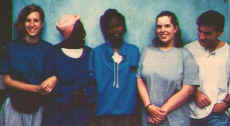Staying with our new families in bustling
Nairobi
|
|
 Preparing for our homestays Preparing for our homestays
Jonathan Tourzan
That night we had a meeting to prepare for our homestays. Maina gave us
some clues on what to expect. He answered all our questions and taught us more useful
phrases for our homestays. He explained that our hosts would expect us to eat several
helpings of food and that they would find it rude if we did not finish our food. If we
would say, “Nimeshiba sana” (I am very satisfied) and smile nicely, then they
would understand that we had eaten enough and would not be offended.
We finished the evening by writing messages on the postcards that we were
sending to our Peace Wreath sponsors in the U.S.. All the students sent a personal message
to everyone from whom they had received a ribbon. After we finished this task, we went to
bed curious and excited about what new adventures the next day would bring.
The next day our homestays began. Half of the group took a van from the YMCA to Muranga,
while the other half waited at the YMCA for their homestay families. Most students went to
Fort Jesus, a Nairobi suburb, on the north side of town. A few students, however, stayed
in a south Nairobi suburb. Each student stayed with families of different age and social
status.
Each student stayed with their Nairobi family for three days and two
nights, and, after the homestays, we returned to the YMCA to discuss our impressions. With
Maina's help, we processed some of our experiences. Each student shared his or her unique
experience with the group. These insights into the homestay of each student helped to
clarify some nebulous thoughts that individual students might have had about their own
experience.
 Crossing
over Crossing
over
Heather Hoppas
My first homestay was in Nairobi. I felt nervous and excited as I waited
for my homestay mom to arrive. As she walked toward me, I noticed her beautiful, bright
eyes and her small, tight braids. She had a wonderful, warm smile and was wearing a long
blue dress. After we greeted each other, we started walking to the market. When we got
there, she told me that we were buying food for supper.
As we crossed the street, she held my hand, and I felt relieved because I
forgot which way to look before crossing the street. I still had not gotten use to cars
driving on the left side of the street in Kenya. After shopping, we stopped in a store for
sodas, got on a bus, and headed for my new home.
 Giving heart gifts Giving heart gifts
Leah Mowery
I got up in the morning from my bed and went outside. I felt warm from
the sun, and I could hear the sounds of people out on the dirt road just beyond my
family's fence. My sister, Marriane, gave me some water to wash with and a cup to brush my
teeth. Because they didn't have running water for the sink or a shower, I went into a dark
stall and washed my arms, legs and face.
|
|



In Nairobi we learned about city life from our Kenyan brothers and
sisters
 | We discovered a universal love that unites people across cultures.
|

I felt good tucked away in this cool, dark corner, and the water was
refreshing.
After I packed, we had breakfast together. Marriane had prepared French
toast and cocoa for me. We sat and talked, knowing that this was my last day. I felt good
being with her—so connected. The last night we had stayed up and talked for hours.
She told me about her home out in the countryside, about how people caught fish there, and
about the different beliefs that they followed. One story told of a group of religious
people who would go around at night in a trance, trying to scare people by scratching on
doors or windows. If they did not succeed, they would go away. She told me that she felt
relieved not to live there anymore.
Then she stood up and took a basket from a shelf. “This is a present
for you,” she said. “It is from Mombasa. I will get you some more when I go
there. It is for carrying fruit and vegetables.”
I felt so happy. I got out my present for her, a colored scarf; I felt that it was somehow
inadequate. It alone couldn't express all the gratitude and happiness that I felt.
As I was leaving, Mama Marriane gave me a kanga (wrap around skirt) to
wear. We stood there together, and I felt like these people were giving me so much. They
provided me with a wonderful experience in their home, and they also showed me
appreciation through their gifts.
 Admiring a leader Admiring a leader
Vanessa Tubbs
Shortly before my homestay in Nairobi, the Minister of Foreign Affairs,
Dr. Ouko, was killed. I was living with a family on the outskirts of Nairobi at the time
of Ouko's funeral. I watched members of my homestay family mourn his death. My homestay
mother, Florence, and her sister, Irene, cried openly while his funeral was being
televised. Later, I talked to many people in Nairobi who were also deeply saddened by his
death.
I thought about how little I would be affected if someone killed an
American political leader; that thought upset me. My generation of Americans, at least the
students I know, don't feel that they have political leaders to respect and admire.
Kenyans my age also struck me by their dedication to the growth and development of their
country. So many teen-agers in my country don't seemed concerned about the welfare of
America. Since my return, I have noticed that I have become more aware and concerned about
what is going on in my country.
|